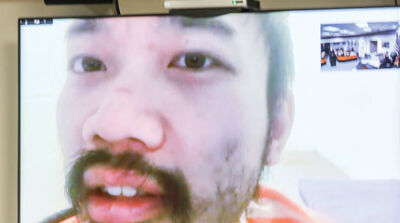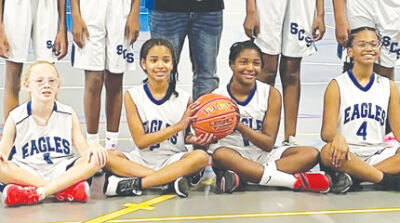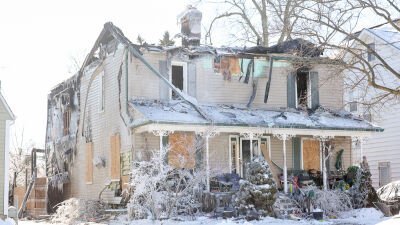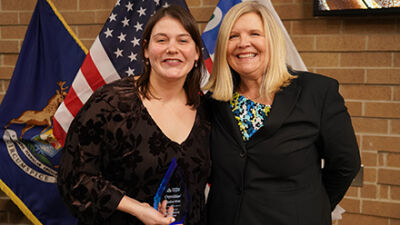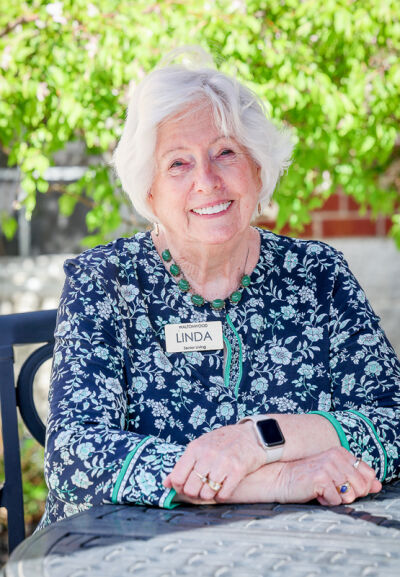
Linda Cooper, 75, of Novi, seen here April 28, is a mother to two biological daughters and a son whom she adopted later in life, and a grandmother to seven.
Photo by Patricia O’Blenes
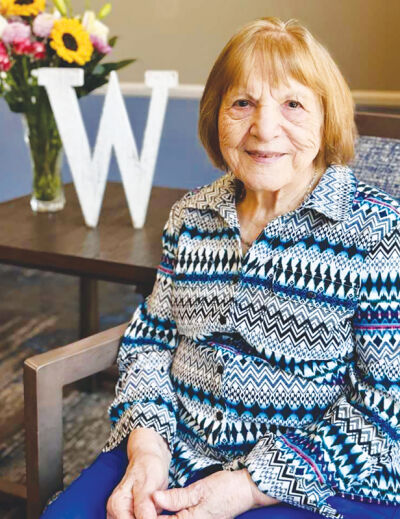
Rose Androff, 103, a mother of four, grandmother of 13, and great-grandmother of 11, poses for a picture April 25 in the lobby of Waltonwood Twelve Oaks in Novi, where she resides.
Photo provided by Waltonwood
NOVI — With Mother’s Day fast approaching, seniors at Waltonwood Twelve Oaks in Novi sat down April 25 to talk about their personal experiences with motherhood and offer some advice to young mothers in the community.
Rose Androff, 103, and Linda Cooper, 75, both said that although parenting methods and techniques have changed over the years, the key to being a successful mother is to simply “listen to your children.”
Androff has plenty of experience, as she is a mother of four, grandmother of 13 and great-grandmother of 11.
She was just 20 when she started her motherhood journey with the birth of her son, Chris, in 1941, the year the United States entered World War II, and before the war was over she would be a mom of two as the first of her three daughters was born in 1945.
Androff said that the main thing about parenting during the war was that food and other necessities were rationed.
“I didn’t suffer from (the rations). We got by,” she said. “The only thing was we couldn’t buy a car because they were making airplanes. So, we couldn’t buy a car until after the war and I had (two) kids so we managed with it. I don’t know how, but we did. I mean, we didn’t go hungry or anything.”
Androff said she was a stay-at-home mom until her youngest daughter went to school and she entered the workforce as a secretary and ultimately went into income tax preparation and real estate.
Cooper said that motherhood was most challenging when it was new.
“I didn’t know what I didn’t know. I just thought when you brought the baby home that you would know everything. I mean, that’s how naive I was,” Cooper said. “So, I think the biggest challenge was just being afraid I was going to do something wrong, but at the same time, just being so in love that I think they measured each other out.”
She recalled a time shortly after her son was born when she thought her son had the measles, and after calling the doctor over for a house call, it turned out he had a heat rash as she had unknowingly dressed him too warm on a summer day.
Androff said that at the time she was rearing her three older children, diapers were made of cloth, but shortly after her youngest child was born in 1960, disposable diapers entered the market and she was able to use them for her.
“It was hard because you are always busy, and especially when your husband’s in business and you’re helping him too, and you got your kids and now there’s diapers to wash and I’d have to go wash the diapers,” Androff said. “But I did it with love. I thought it’s worth washing diapers for the joy they give you when they’re little like that.”
Cooper said that although disposable diapers were readily available in 1973, they were expensive, so like Androff, she used cloth diapers.
Cooper said she was able to help keep her family afloat in 1973 by watching her neighbor’s two young children for $25 a week.
“We learned to live on not much,” said Cooper.
She said that their first apartment was in a basement, because it was $5 dollars cheaper per month. She said the $60 savings per year was a lot back then. She said that as a young couple starting out, they had no furniture. She said they just put a mattress on the floor.
“It’s amazing how you can do without. I don’t know if young people can understand that,” she said.
She said that is something she thinks is a challenge for young couples and parents today.
“They don’t know (how to go without). They don’t know about eating Cheerios for dinner, and it was all OK. Everyone around us was doing the same thing,” Cooper said.
Androff said her family did not have a television until 1949. She said the TV was black and white and said that although her children enjoyed programming such as “Howdy Doody,” and “Soupy Sales,” they didn’t have to worry about the device being constantly on as the stations stopped broadcasting after the nightly news ended and the national anthem was played. Consequently, all TVs were off by midnight every day.
Cooper said the first electronic system they purchased for their children was an Atari that they purchased around 1979 or 1980. She said the family preferred to be outdoors, and they took the kids tent camping from the time they were infants and then got into softball.
She said that she can see both the benefit and the harm of electronics being so readily available and advanced today.
“To me, as a parent, the scary thing is how instantaneous something happens, that if something bad happens at school to your child, that it is all over the social media of their friends before you’ve even found out about it to be able to address it, and I worry about that. I don’t see that as a good thing,” Cooper said.
Androff stressed that she was most interested in her children learning in school, supporting their talents, and that they be good citizens. She said she is very proud of how her children turned out. Her youngest daughter she raised as a single mother after her husband died when her daughter was 14.
She said she has always advised her grandchildren to educate their children about things they might encounter and how to properly handle themselves. However, she said they tell her that they often don’t feel that they should tell them, because “they know what to do.”
“They’re too lenient today,” Androff said.
She recalled that when her children were growing up, they didn’t have to lock their doors and the children would play outside until the streetlights came on.
“We kept our kids busy,” Androff said. “We kept our kids busy so that they didn’t have time to go out and get in trouble.”
She said it was important to note and mold one’s children’s talents.
Although Cooper is 28 years younger than Androff, her parenting experience was similar in many ways, yet different.
Cooper and her husband, Paul, have six living grandchildren. They raised two biological daughters, and then just when they became “empty nesters,” they were asked to take on guardianship of a 13-year-old boy, Phillip, in 2000. Phillip was the cousin of Cooper’s son-in-law, and his mom was shot and killed while walking down the street in Detroit.
“It was interesting,” Cooper said of her experience as a guardian. “Because not only were we older, but he was of color and we were white. So my motherhood (experience) changed over the years.”
She said that she thought Phillip was her second chance at rearing a child. She said she was only 21 when she had her first child. Therefore, she said she thinks she was growing up just as her daughters were, but with Phillip, she was much more experienced.
“The first time I went to a parent-teacher conference, I don’t know if they were more confused because I was white or because I was old,” she said with a laugh.
“I think there’s a lot of good moms out there doing their best,” Androff said.
“I wouldn’t want to raise a kid today; there are too many things out there to ruin a kid,” Androff said. “People aren’t as kind as they used to be. … There’s a lot of things out there that tempt our kids to go wrong.”
She said parents just need to plan and do things with their kids.
Androff’s youngest daughter, Marilyn Suttle, 64, recalled that her mom gave her that simple advice to listen to children when she had her first child.
“She’s really about, ‘How do they feel?’ Don’t get mad at them until you think about it from their perspective,” Suttle said.
Androff said that if a kid asks a question and if you don’t know the answer, don’t tell the child that. Simply say, “Let’s look it up.”
She said it wasn’t until her third child that she learned not to tell a child what decision to make. Instead, she said she learned to help guide their decisions by asking questions about the subject, and the child would find the answers.
“I didn’t have to make a decision for them that way. They made their own decisions,” she said.
Suttle said her mom is often referred to as the “baby whisperer,” as she is really good at understanding a baby’s nonverbal cues.
“I like all the stages (of childhood) until they get a bit sassy, but they get over that. That’s normal,” Androff said. “Then, when they get to high school, then they get smarter than me.”
She said that is when the challenge begins to keep kids interested in what you know and have to say.
Both women not only experienced the joys of motherhood, but sadly, each of them experienced the loss of a child. Androff’s daughter, Nancy, died suddenly at the age of 41. Cooper’s son, Phillip, died at 19 from a cardiac arrest while playing basketball during his first year at Michigan State, and one of her grandchildren died by suicide at the age of 20. She stressed the importance of mental health.
“It frustrates me the lack of support for people with mental health issues,” Cooper said.
Cooper said she thinks there are trade-offs no matter when you enter motherhood. She said as a young mother, you grow up with your kids, but they are grown and gone sooner, so by middle age, you are free to concentrate on yourself again. As an older mom, you may be mistaken for their grandmother, but you are more confident in your decisions.
“I think there’s trade-offs however you do it,” said Cooper. “I don’t think there can ever be a wrong way to becoming a mom.”
She said the best advice she could give a mom today is to just try and stay calm and trust yourself, don’t second-guess your decisions, and to stay involved in your children’s lives.
“It was a great joy being a mother, and you think if it was a great joy being a mother, imagine being a grandmother and a great-grandma,” Androff said.
“I love being a mom and I love being a grandma better, because while I still worry about the grandkids, I’m not totally responsible for them and I can give them sugar and send them home,” Cooper said. “I can just enjoy it more without the worry as the parent.”
 Publication select ▼
Publication select ▼





